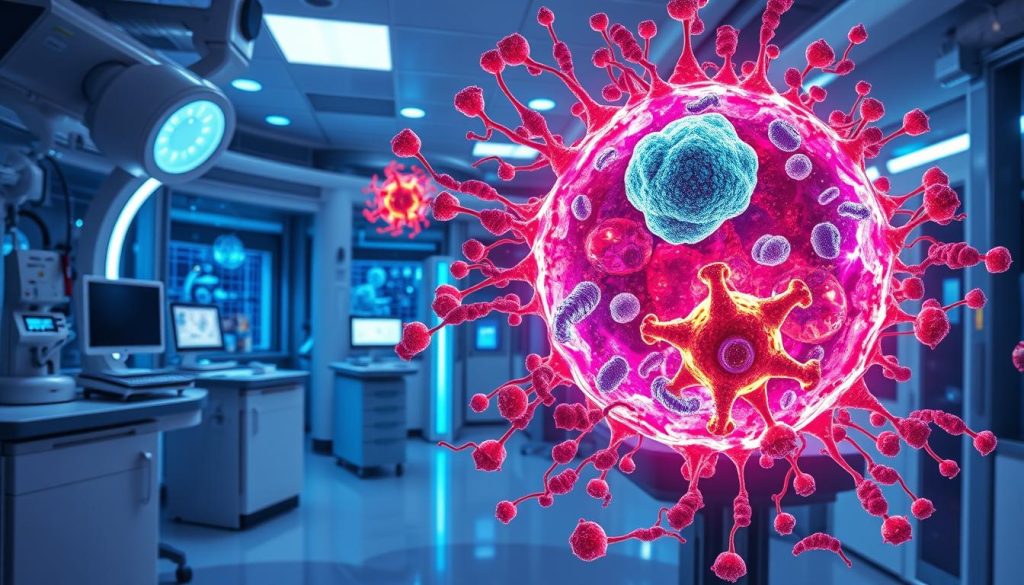When cancer comes back or doesn’t respond to treatment, people look for the best options. CAR T-cell therapy is a new, hopeful treatment for some cancers. But is it the last choice?
This guide will dive into CAR T-cell therapy. We’ll cover its basics, its role in saving lives, and the cancers it can treat. We’ll also look at who can get it and when doctors might suggest it.
We’ll also talk about how CAR T-cell therapy works, its side effects, and how well it works. By the end, you’ll know if CAR T-cell therapy is a last resort or a good choice at different cancer stages.
What is Car T-Cell Therapy?
CAR T-cell therapy is a new way to fight cancer. It uses a patient’s own immune system. This method involves changing T-cells to target and kill cancer cells.
Understanding the Basics of CAR T-Cell Therapy
At the heart of CAR T-cell therapy are chimeric antigen receptors (CARs). These receptors are made to find specific proteins on cancer cells. This way, T-cells can attack cancer cells without harming healthy ones.
This therapy is special because it’s tailored for each patient. T-cells are taken, changed, and then given back to the patient. It’s like creating a custom army to fight cancer.
“CAR T-cell therapy represents a major advancement in cancer treatment, giving hope to those who’ve tried everything else.” – Dr. Emily Thompson, oncologist
How CAR T-Cell Therapy Works
The therapy involves several steps:
- T-cell collection: Blood is taken, and T-cells are separated.
- Genetic modification: T-cells are changed in a lab to have CARs.
- T-cell expansion: The modified T-cells are grown in the lab.
- Lymphodepletion: The patient gets chemotherapy to clear their immune system.
- CAR T-cell infusion: The modified T-cells are given back to the patient.
- Monitoring: The patient is watched for side effects and how well they’re doing.
| Step | Description |
|---|---|
| T-cell collection | Blood is drawn from the patient, and T-cells are separated from other blood components. |
| Genetic modification | The collected T-cells are genetically engineered in a laboratory to express CARs on their surface. |
| T-cell expansion | The modified T-cells are grown and multiplied in the lab to create a large number of cancer-fighting cells. |
| Lymphodepletion | The patient undergoes chemotherapy to reduce the number of immune cells in their body, making room for the CAR T-cells. |
| CAR T-cell infusion | The genetically modified T-cells are infused back into the patient’s bloodstream. |
| Monitoring | The patient is closely monitored for side effects and treatment response. |
By using gene therapy and immunotherapy, CAR T-cell therapy is a new hope for cancer treatment. It’s promising for those who haven’t responded to other treatments.
Types of Cancer Treated with Car T-Cell Therapy
Car T-cell therapy is showing great promise in fighting certain cancers, mainly blood cancers. It uses a patient’s immune cells to attack and kill cancer cells. This therapy is a new hope in the battle against relapsed and refractory cancers.
Leukemia and Lymphoma
Car T-cell therapy is mainly used for some types of leukemia and lymphoma. These include:
- Acute Lymphoblastic Leukemia (ALL)
- Chronic Lymphocytic Leukemia (CLL)
- Non-Hodgkin Lymphoma (NHL)
- Multiple Myeloma
Patients with these cancers often try other treatments first. But when those fail, Car T-cell therapy can be a last hope. Clinical trials have shown it can lead to remission for many.
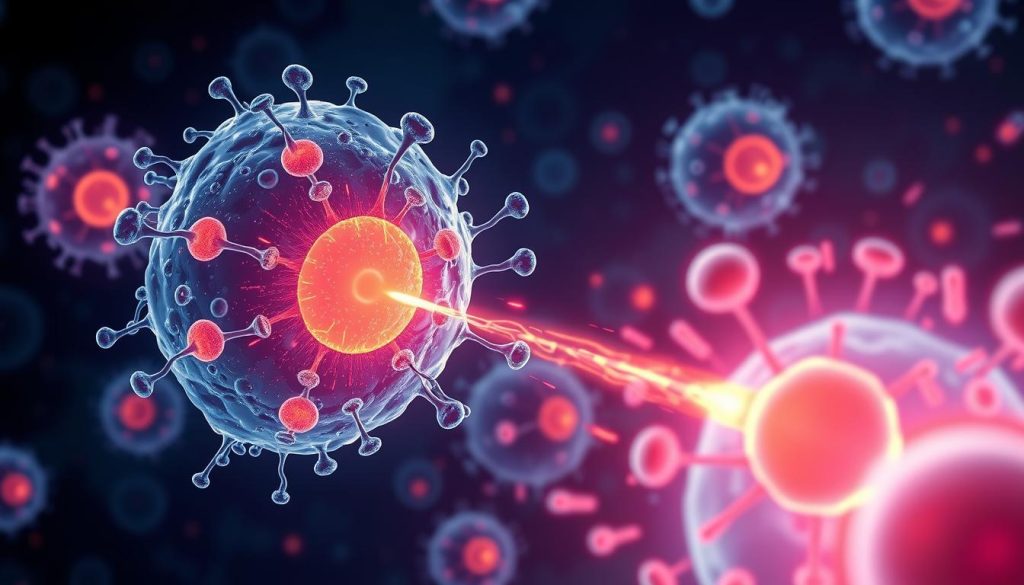
Potential for Treating Solid Tumors
Car T-cell therapy has also shown promise for solid tumors. Solid tumors are harder to treat because the immune cells face more obstacles. But, researchers are working on new ways to use Car T-cell therapy for cancers like:
- Breast Cancer
- Lung Cancer
- Prostate Cancer
- Ovarian Cancer
- Melanoma
As research continues, there’s hope for more cancer types. The success of these trials will show if Car T-cell therapy can help more patients.
When is Car T-Cell Therapy Considered?
Car T-cell therapy is usually considered for patients with relapsed cancer or refractory cancer. Relapsed cancer comes back after a break, and refractory cancer doesn’t respond to first treatments.
Patients who might get car T-cell therapy have tried other treatments like chemo, radiation, or surgery. If these treatments didn’t work well or caused bad side effects, alternative treatments like car T-cell therapy are looked into.
- Type and stage of cancer
- Previous treatments and their results
- How healthy the patient is and their age
- If car T-cell therapy is a good fit
The table below shows when car T-cell therapy might be a good choice:
| Factor | Consideration |
|---|---|
| Cancer type | Primarily used for certain blood cancers, such as leukemia and lymphoma |
| Treatment history | Typically considered after failure of conventional treatments |
| Patient health | Patient must be healthy enough to undergo the therapy |
| Availability | Therapy must be available and suitable for the specific cancer type |
Car T-cell therapy has shown good results for some with relapsed or refractory cancer. But it’s not the right choice for everyone. Talking to a healthcare team skilled in car T-cell therapy is key.
Is Car T-Cell Therapy a Last Resort?
When cancer strikes, patients and doctors look at many treatment options. CAR T-cell therapy is a big success in some cancers, but it’s not always the first pick. Let’s look at why this treatment is considered.
Exploring Treatment Options Before Car T-Cell Therapy
Before CAR T-cell therapy, doctors often suggest other treatments. These include:
- Chemotherapy
- Radiation therapy
- Targeted therapy
- Stem cell transplant
These alternative treatments work well for many. They might be tried first, based on the cancer type and stage.
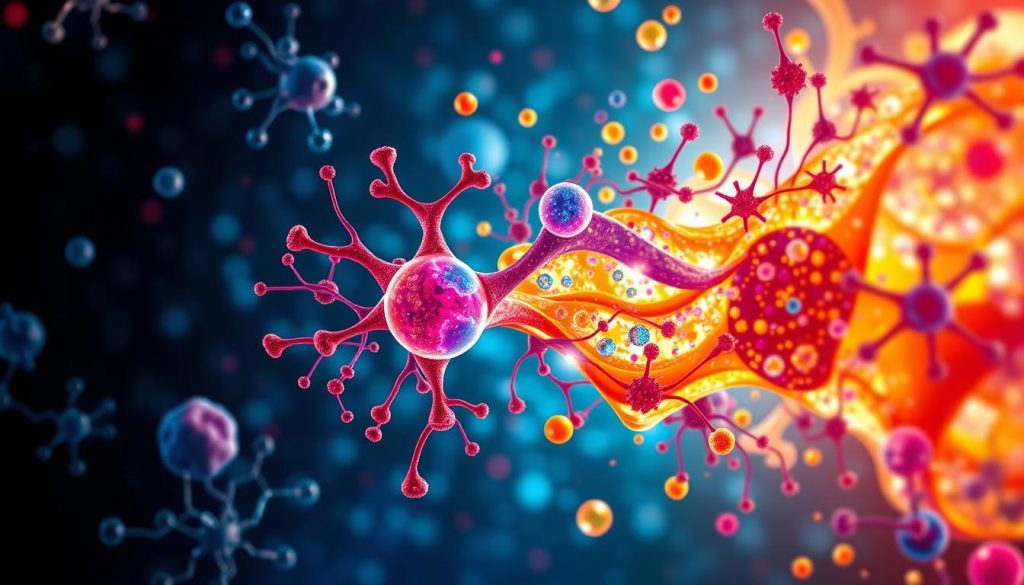
| Factor | Consideration |
|---|---|
| Type of cancer | CAR T-cell therapy works best for certain blood cancers |
| Previous treatments | It’s used when other therapies fail or the cancer comes back |
| Overall health | The patient must be well enough for the treatment |
Cases Where Car T-Cell Therapy May Be the Best Option
In some cases, CAR T-cell therapy is the best choice, not just a last resort. This happens when:
- The cancer is very aggressive and hasn’t responded to other treatments
- The patient has a specific blood cancer, like diffuse large B-cell lymphoma or acute lymphoblastic leukemia
- The benefits for the patient outweigh the risks
CAR T-cell therapy offers hope to those who’ve tried everything else. It gives them a chance at remission and a better life.
Eligibility Criteria for Car T-Cell Therapy
Understanding the eligibility criteria for CAR T-cell therapy is key. Age, overall health, and previous treatments are important. These factors help decide if a patient is right for this new treatment.
Age and Overall Health Considerations
Age matters when looking at CAR T-cell therapy. There’s no strict age limit, but most trials focus on:
- Adults (18 years or older) for certain lymphomas and multiple myeloma
- Children and young adults (up to 25 years old) for specific leukemias
Health is also a big factor. Patients should have:
- Good organ function (heart, lungs, kidneys, and liver)
- A strong immune system to make enough T-cells
- No active infections or severe health issues
Previous Treatment History
CAR T-cell therapy is for those who’ve tried other treatments without success. The criteria for previous treatments include:
| Cancer Type | Previous Treatments |
|---|---|
| Leukemia | At least two prior therapies, including chemotherapy and stem cell transplant |
| Lymphoma | At least two prior therapies, including chemotherapy and targeted drugs |
| Multiple Myeloma | At least four prior therapies, including proteasome inhibitors and immunomodulatory drugs |
Even those who’ve had other immunotherapies might be eligible. It depends on the trial and how well they responded to previous treatments.
“CAR T-cell therapy offers hope to patients who have exhausted conventional treatment options, but careful evaluation of eligibility criteria is critical for the best outcomes.”
The Car T-Cell Therapy Process
CAR T-cell therapy is a groundbreaking personalized medicine that uses a patient’s immune system to fight cancer. It involves several steps, from collecting T-cells to genetic modification, lymphodepletion, and infusion. After that, patients receive close monitoring and follow-up care.
T-Cell Collection and Genetic Modification
The first step is collecting the patient’s T cells, a key part of the immune system. This is done through leukapheresis, which filters the blood to get the T cells. Then, these T cells are genetically modified in a lab to target cancer cells.
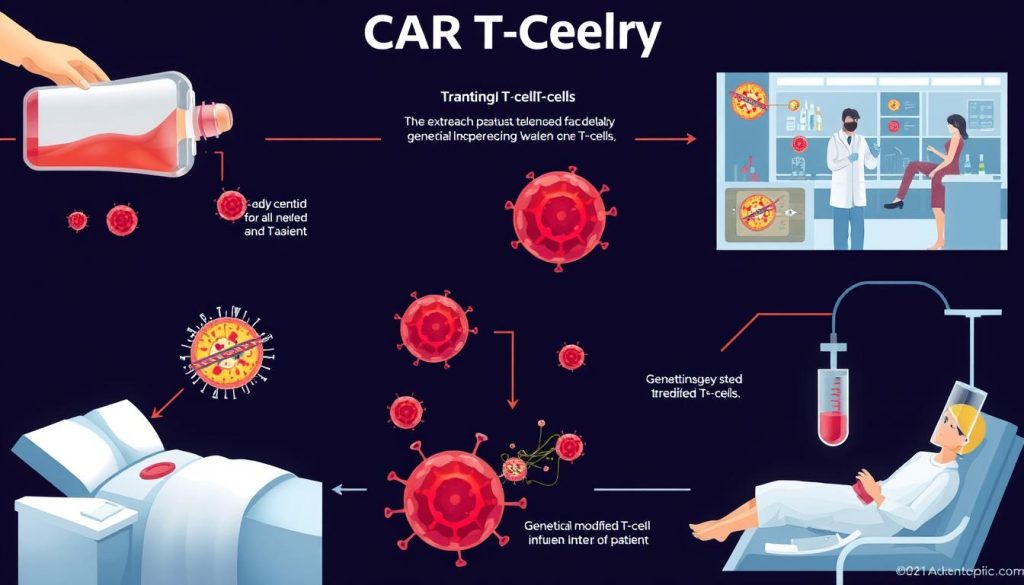
Lymphodepletion and CAR T-Cell Infusion
Before getting the CAR T cells, patients go through lymphodepletion. This is a conditioning regimen that uses chemotherapy or radiation to lower immune cells. It makes room for the CAR T cells to work well. After that, the modified CAR T cells are infused back into the patient’s body to fight cancer.
Monitoring and Follow-Up
After infusion, patients are watched for side effects and how well they’re responding. Common side effects include:
- Cytokine release syndrome (CRS)
- Neurological toxicities
- B-cell aplasia
- Tumor lysis syndrome
These side effects can vary in severity and duration. Medical teams are ready to handle them. Patients also have regular check-ups to see how the treatment is working and if cancer has come back.
The CAR T-cell therapy process shows the amazing progress in personalized medicine and gene therapy. It gives hope to patients with few treatment options before.
Potential Side Effects and Risks
CAR T-cell therapy has shown great success in fighting some cancers. Yet, it comes with possible side effects and risks. It’s key for patients to know these before they decide to get the treatment.
One common side effect is cytokine release syndrome (CRS). This happens when the immune system gets too active. It releases a lot of cytokines into the blood. Symptoms can range from mild flu-like issues to serious problems like:
- High fever
- Low blood pressure
- Difficulty breathing
- Organ dysfunction
Another risk is neurological toxicity. This can cause confusion, delirium, seizures, or even coma. Though these effects can be serious, they are often managed with quick medical help and care.
To lessen the risks, patients are watched closely during and after treatment. Doctors are ready to spot and handle CRS or neurological toxicity. This ensures patients get the right care for these side effects.
“The benefits of CAR T-cell therapy often outweigh the risks for many patients, even those who have tried other treatments.”
The side effects’ frequency and severity can change based on the CAR T-cell product and the patient’s health. Clinical trials keep working to make CAR T-cell therapy better. They aim to lessen these side effects’ impact.
Success Rates and Long-Term Outcomes
CAR T-cell therapy is showing great promise in fighting cancer, mainly blood cancers like leukemia and lymphoma. As more trials happen and data grows, we’re learning more about its success and long-term effects.
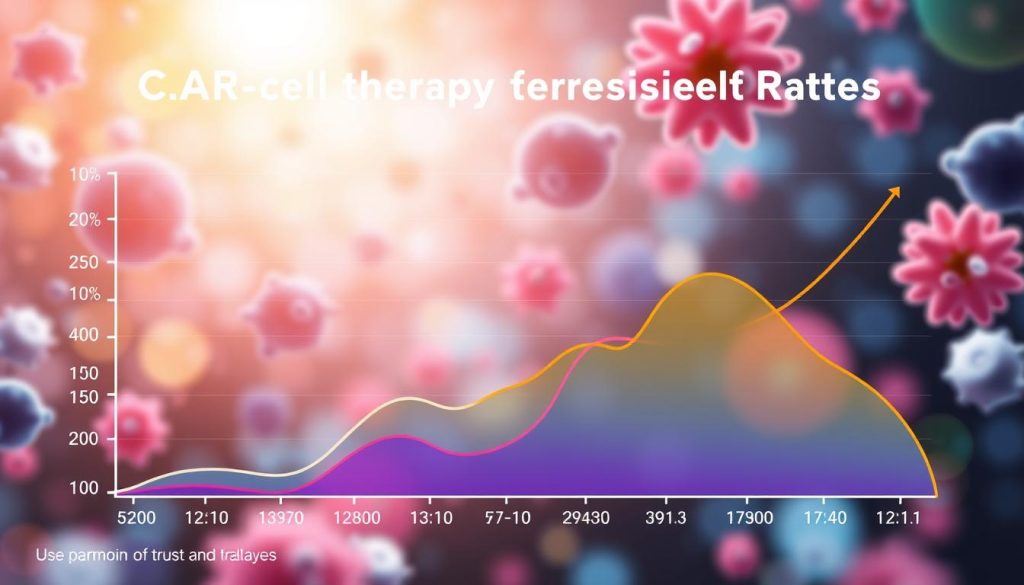
Remission Rates for Different Cancer Types
The success of CAR T-cell therapy varies by cancer type. In trials, some blood cancers like leukemia and lymphoma have seen high remission rates:
| Cancer Type | Remission Rate |
|---|---|
| Acute Lymphoblastic Leukemia (ALL) | Up to 90% |
| Diffuse Large B-Cell Lymphoma (DLBCL) | 40-50% |
| Mantle Cell Lymphoma (MCL) | 60-70% |
While these numbers are hopeful, not every patient responds the same way. Age, health, and past treatments can affect how well the therapy works.
Quality of Life After CAR T-Cell Therapy
Many patients see a big boost in their quality of life after CAR T-cell therapy. One survivor said, “CAR T-cell therapy gave me a second chance at life. I’m now enjoying time with my family and pursuing my passions without fear of relapse.”
But, the road to recovery can be tough. Side effects like cytokine release syndrome and neurological issues need careful watching. Also, long-term checks are key to seeing how well the treatment lasts and to catch any late problems.
Comparison to Other Immunotherapies
CAR T-cell therapy has shown great success in treating blood cancers. But, it’s not the only immunotherapy out there. Other alternative treatments like checkpoint inhibitors and adoptive cell therapies also use the immune system to fight cancer.
Checkpoint inhibitors, such as PD-1 and CTLA-4 inhibitors, block proteins that stop immune cells from attacking cancer. These drugs have been effective against solid tumors like melanoma, lung cancer, and kidney cancer. On the other hand, CAR T-cell therapy mainly targets blood cancers like leukemia and lymphoma.
Adoptive cell therapies collect and modify immune cells from a patient’s body. They are then reinfused to attack cancer cells. TIL therapy and NK cell therapy are examples. These therapies are similar to CAR T-cell therapy but use different immune cells and modifications.
These immunotherapies might work better together to treat cancer. For example, combining CAR T-cell therapy with checkpoint inhibitors could make both treatments more effective. This is because they target cancer cells and boost the immune system at the same time. As research continues, doctors might create personalized treatment plans using different immunotherapies based on a patient’s cancer type and genetic profile.
Combining Car T-Cell Therapy with Other Treatments
CAR T-cell therapy has been a game-changer for some blood cancers. Researchers are now looking to make it even better. They want to mix it with other cancer treatments like chemotherapy, radiation, or other immunotherapies.
This mix-up is based on a smart idea. Each treatment works in its own way to fight cancer. Together, they might do a better job than alone. This could lead to better results and help with CAR T-cell therapy’s limits.
Using Car T-Cell Therapy with Chemotherapy or Radiation
Chemotherapy and radiation are old friends in cancer fights. Now, they’re being tested with CAR T-cell therapy. In some clinical trials, a short chemotherapy or radiation treatment comes before CAR T-cell therapy. This makes it easier for the T-cells to work well.

Also, these treatments might make tumors smaller before CAR T-cell therapy starts. Smaller tumors could make it easier for CAR T-cells to find and kill the rest of the cancer.
Potential for Combining with Other Immunotherapies
Immunotherapy has grown a lot in recent years. It uses the body’s immune system to fight cancer. Mixing CAR T-cell therapy with other immunotherapies is a new and exciting area of research.
Checkpoint inhibitors, for example, help T-cells fight cancer better. By adding these to CAR T-cell therapy, researchers hope to make the immune attack stronger and longer-lasting.
“The combination of CAR T-cell therapy with other immunotherapies is very promising. It could lead to better treatments for hard-to-treat cancers and better results for patients.”
Many clinical trials are looking into mixing CAR T-cell therapy with alternative treatments like checkpoint inhibitors or cancer vaccines. These early efforts show great promise for the future of cancer treatment.
| Combination Approach | Mechanism of Action | Potential Benefits |
|---|---|---|
| CAR T-cell therapy + Chemotherapy/Radiation | Lymphodepletion, tumor debulking | Enhanced CAR T-cell expansion and efficacy |
| CAR T-cell therapy + Checkpoint Inhibitors | Releasing brakes on immune system | Stronger and sustained anti-tumor response |
| CAR T-cell therapy + Cancer Vaccines | Stimulating immune response against tumor antigens | Improved specificity and long-term protection |
Access and Availability of Car T-Cell Therapy
Car T-cell therapy is a special treatment found in a few cancer centers in the U.S. It’s not everywhere yet. Patients and families need to know about the approved treatments and clinical trials available.
Approved Car T-Cell Therapies
The U.S. FDA has okayed some CAR T-cell therapies for blood cancers. These include:
- Kymriah (tisagenlecleucel) for acute lymphoblastic leukemia and large B-cell lymphoma
- Yescarta (axicabtagene ciloleucel) for large B-cell lymphoma
- Tecartus (brexucabtagene autoleucel) for mantle cell lymphoma
- Breyanzi (lisocabtagene maraleucel) for large B-cell lymphoma
These treatments are made by big pharma companies. They are given at special treatment centers.
Clinical Trials and Experimental Treatments
There are also clinical trials for CAR T-cell therapy. These trials test new treatments for different cancers. They offer a chance to try new therapies that aren’t available yet.
“Participating in a clinical trial can provide access to cutting-edge therapies and contribute to the advancement of cancer treatment,” notes Dr. Sarah Thompson, an oncologist specializing in personalized medicine.
If you’re interested in CAR T-cell therapy, talk to your oncologist. They can check if you’re a good fit for an approved treatment or a trial. As research grows, more people will get to try this promising treatment.
Cost and Insurance Coverage
CAR T-cell therapy is a personalized medicine with a high price. It can cost over $300,000 per treatment. This is because it’s a complex process that genetically modifies T-cells to fight cancer.
Insurance coverage for CAR T-cell therapy varies. It depends on the treatment, the patient’s insurance, and if it’s medically necessary. Many private insurance companies and Medicare cover FDA-approved CAR T-cell therapies for blood cancers. But, coverage might need prior authorization and certain criteria.
There are efforts to make CAR T-cell therapy more affordable. Some hospitals offer financial help, payment plans, or insurance guidance. Researchers and companies are also trying to make the process cheaper without losing its effectiveness. As more treatments become available, prices might drop.
Even with the high costs, CAR T-cell therapy’s long-term benefits are significant. It offers hope to those who have tried other treatments. As the therapy advances, making it more affordable will be key to helping more people.
FAQ
Q: What is CAR T-cell therapy?
A: CAR T-cell therapy is a new way to fight cancer. It changes a patient’s T-cells to attack cancer cells. This method is a personalized treatment for some cancers.
Q: What types of cancer can be treated with CAR T-cell therapy?
A: CAR T-cell therapy mainly helps with blood cancers like leukemia and lymphoma. But, research is looking into using it for solid tumors too.
Q: When is CAR T-cell therapy considered as a treatment option?
A: It’s considered when other treatments have failed. It might be the best choice for some patients, based on their situation.
Q: What are the eligibility criteria for CAR T-cell therapy?
A: Who can get CAR T-cell therapy depends on age, health, and past treatments. These factors help decide if someone can try it.
Q: What are the side effects and risks of CAR T-cell therapy?
A: Side effects include cytokine release syndrome and neurological issues. These are watched closely during and after treatment. Research aims to lessen these risks.
Q: What are the success rates and long-term outcomes of CAR T-cell therapy?
A: Success rates vary by cancer type. Trials show good results for some blood cancers. Research is also looking at how it affects patients’ lives long-term.
Q: How does CAR T-cell therapy compare to other immunotherapies?
A: CAR T-cell therapy is unique because it’s targeted and personalized. It’s different from other immunotherapies, like checkpoint inhibitors, but can work together in treating cancer.
Q: Can CAR T-cell therapy be combined with other treatments?
A: Yes, researchers are looking into combining it with other treatments. This could make it more effective. Trials are exploring these combinations.
Q: How accessible and available is CAR T-cell therapy?
A: Right now, CAR T-cell therapy is not widely available. But, trials and research are working to make it more accessible. They aim to overcome current challenges.
Q: What are the costs and insurance coverage options for CAR T-cell therapy?
A: CAR T-cell therapy is expensive. Insurance coverage varies. Efforts are being made to make it more affordable for those who could benefit from it.












